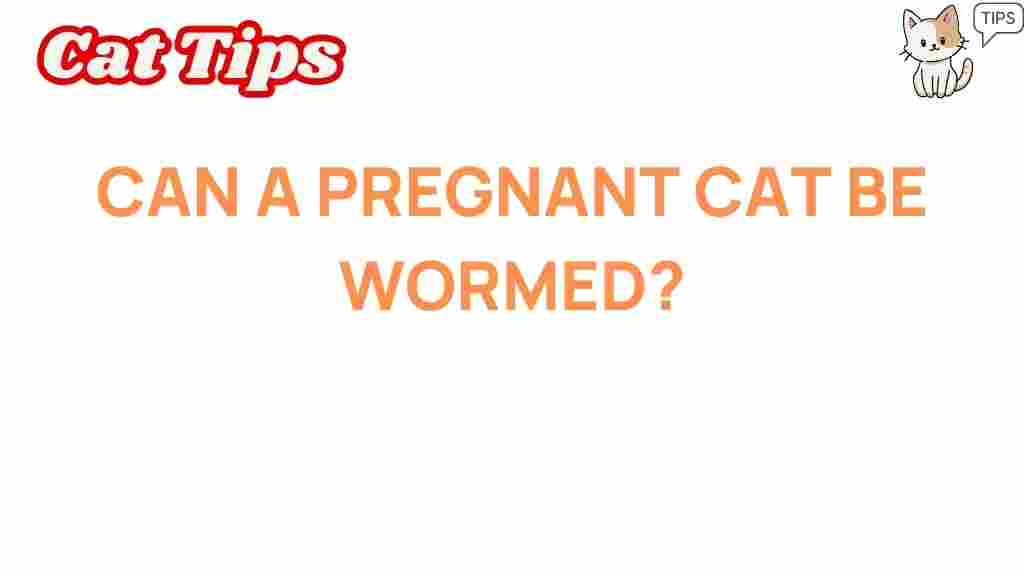Unraveling the Mystery: Can a Pregnant Cat Be Wormed Safely?
The health of a pregnant cat is paramount, not just for her well-being but also for the health of her kittens. As a cat owner, ensuring your feline companion is free from parasites is essential, especially during pregnancy. However, many pet owners wonder: can a pregnant cat be wormed safely? This article delves into the intricacies of worming a pregnant cat, ensuring you have all the information needed to make an informed decision.
Understanding Worms in Cats
Worms are common parasites that can affect cats, including those that are pregnant. The most prevalent types of worms include:
- Roundworms: These are the most common intestinal parasites in cats. Pregnant cats can transmit roundworms to their kittens through the placenta or milk.
- Tapeworms: Cats typically contract tapeworms through ingesting fleas or rodents. While not as dangerous as roundworms, they can still lead to weight loss and gastrointestinal issues.
- Hookworms: Less common but potentially harmful, hookworms can cause anemia and significant health issues in both the mother and her kittens.
Signs of Worm Infestation in Pregnant Cats
Identifying a worm infestation early can help in timely treatment. Common signs to watch for in a pregnant cat include:
- Weight loss or failure to gain weight
- Visible worms in feces or around the anus
- Vomiting or diarrhea
- Abdominal bloating or discomfort
- Poor coat condition
Is It Safe to Worm a Pregnant Cat?
The safety of worming a pregnant cat largely depends on the type of medication used and the timing of administration. Here’s what you need to know:
- Consult Your Veterinarian: Always seek professional advice before administering any medication to a pregnant cat. Your vet will recommend the safest options based on the stage of pregnancy and the specific worm type.
- Timing Matters: The safest time to worm a pregnant cat is typically during the second trimester (weeks 4-6). Avoid worming during the first trimester, as this is a critical period for fetal development.
- Choose the Right Medication: Some worming medications are safer than others for pregnant cats. Your vet can prescribe appropriate treatments that minimize risks to the mother and her kittens.
Step-by-Step Process for Worming a Pregnant Cat
If a veterinarian recommends worming your pregnant cat, follow these steps to ensure a safe and effective process:
Step 1: Schedule a Veterinary Visit
Make a thorough examination appointment with your veterinarian. Discuss your cat’s health, any signs of worm infestation, and the best worming treatments available.
Step 2: Follow Your Vet’s Instructions
Once your vet prescribes a suitable worming medication, carefully follow the dosage and administration instructions provided. Do not exceed the recommended dosage.
Step 3: Monitor Your Cat
After administering the medication, keep an eye on your cat for any adverse reactions. Common side effects can include:
- Vomiting
- Diarrhea
- Lethargy
Step 4: Maintain Hygiene
Ensure your cat’s living area is clean to prevent re-infestation. Regularly clean litter boxes and remove any feces promptly.
Step 5: Schedule Follow-Up Appointments
After treatment, return to your vet for follow-up appointments. This is crucial to ensure the worms are eliminated and to monitor the health of both the mother and her kittens.
Potential Risks of Worming a Pregnant Cat
While worming is necessary, there are potential risks involved:
- Medication Side Effects: Some cats may experience side effects from worming medications, which can affect their health and the developing kittens.
- Timing of Administration: Worming too early or too late in the pregnancy can pose risks to the kittens and may not effectively eliminate the worms.
- Re-infestation: If proper hygiene isn’t maintained, a pregnant cat can get re-infested quickly, leading to repeated treatments.
Troubleshooting Tips
If you encounter issues while worming your pregnant cat, consider the following tips:
- Consult Your Veterinarian: Always return to your vet if you notice unusual symptoms or reactions after worming.
- Check for Other Health Issues: Sometimes, the symptoms of worm infestation can mimic other health problems. A thorough examination may be needed.
- Maintain a Healthy Diet: Ensure your pregnant cat is on a balanced diet to support her immune system during treatment.
Conclusion
Worming a pregnant cat is a delicate process that requires careful consideration and veterinary guidance. The health of the mother cat and her kittens is vital, so always prioritize professional advice. By understanding the risks and following a structured approach, you can ensure a safe worming experience for your pregnant cat. For more information on caring for your feline friend during pregnancy, visit this resource.
Remember, a healthy cat leads to healthy kittens. Stay proactive in your pet care routine and consult your veterinarian for any concerns or questions regarding the health of your pregnant cat.
If you have further inquiries about cat care or want to learn more about common health issues, check out this article.
This article is in the category Health and created by CatTips Team
